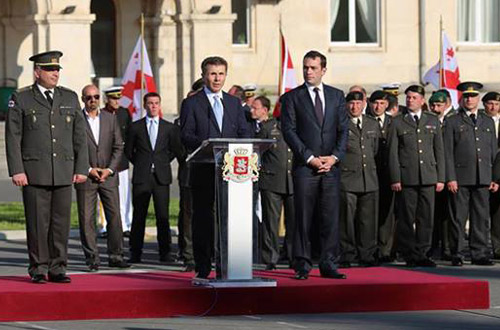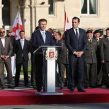
‘Five Days’ War’ Five Years Later
Publication: Eurasia Daily Monitor Volume: 10 Issue: 149
By:

Last week, Georgia marked the five-year anniversary of the start of the short military conflict with Russia over South Ossetia and Abkhazia. The conflict ended in Georgia’s defeat and the recognition of the independence of its former autonomies by the Russian Federation. The mourning ceremonies started in Georgia not on the eighth, but on the seventh of August. On this day, five years ago, two Georgian peacekeepers died in the Georgian village of Avnevi in South Ossetia after an artillery strike by Ossetian armed units (https://lenta.ru/news/2008/08/07/fire2/). Tbilisi regards this incident as the start of the war, although clashes and mutual shelling of Georgian and Ossetian positions had continually carried on for several months prior to full-fledged war erupting on August 8, when the Georgian army began storming Tskhinvali (https://www.ceiig.ch/Report.html).
Military conflict in the separatist region of South Ossetia turned into a large-scale war with the Russian army that expanded into parts of Abkhazia as well as western and eastern Georgia. Russian armed forces launched missile and bomb attacks—including short-range Iskander missiles (https://www.novayagazeta.ru/inquests/2303.html)—on the entire territory of the country, from the Black Sea city port of Poti (https://??????.??/news/polit/1038678.html) to the city of Marneuli (https://lenta.ru/news/2008/08/08/marneuli/), located on the Georgian-Azerbaijani border.
Within the five days of conflict, 70 Georgian military servicemen, 14 police officers and 150 civilians died (https://www.inosmi.ru/sngbaltia/20130809/211721278.html). The Russian army’s losses amounted to 67 servicemen (https://forum.topwar.ru/topic/2094-?????-?-?????-??????-7-12-???????-2008-?-??????-??????-?/). According to the Russian Investigative Committee in the Russian Prosecutor General’s Office, 162 civilians died in South Ossetia during August 8–12 (https://lenta.ru/articles/2013/08/07/war). Russian government sources do not provide details on how many of the killed were in fact members of South Ossetian armed groups (https://www.gazeta.ru/politics/2008/12/23_a_2916550.shtml).
This is the least clear aspect of the “informational war” around South Ossetia that has carried on until now. Precise figures of the killed Georgian and Russian military servicemen are known, but there is no information on the figure of killed servicemen on the Ossetian side. This prompts some analysts to speculate that the 162 killed residents of South Ossetia, mentioned in the report of Russian Prosecutor General Aleksandr Bastrykin, were mostly fighters from the Ossetian armed groups. Since the “Army of South Ossetia” did not exist according to international law, the Russian Prosecutor General’s Office classified them as “civilians” when investigating the case of “genocide” in South Ossetia. It is hard to explain otherwise why Russian official sources do not delineate between the figures for killed civilians and killed servicemen of the armed forces of South Ossetia. The latter became a real military force long before the war itself (https://voiceofrussia.com/2012_08_08/Russia-had-plan-to-rebuff-Georgian-aggression-Putin/). At the same time, President of Russia, Dmitry Medvedev and other Russian officials spoke of 2,000 civilians that were killed in South Ossetia in the fighting (https://www.novayagazeta.ru/news/37390.html).
Georgia’s leaders marked the five-year anniversary of the conflict by laying wreaths on the graves of the fallen. However, the Georgian president and prime minister participated in separate ceremonies, demonstrating their disagreement with regard to fundamental issues, including the causes of the 2008 war. Prime Minister Bidzina Ivanishvili repeatedly accused the president of having provoked the military conflict with Russia. Mikhail Saakashvili, on the other hand, called all discussion of him being at fault unfounded and put the responsibility squarely on Russia. “It has been determined with certainty that the armed units of the Russian army had entered the territory of Georgia (South Ossetia) several days prior to August 8,” the head of state said (https://www.newsgeorgia.ru/politics/20130808/215827172.html). Prime Minister Ivanishvili, in turn, signaled that Georgia must look to the future instead of dwelling on the past. Speaking at a swearing in ceremony of new Georgian army servicemen, he expressed his readiness to engage in direct talks with the leaderships of Abkhazia and South Ossetia (https://rus.ozodi.org/content/article/25071059.html). President Saakashvili always refused to participate in such talks, pointing to the Kremlin’s full control over decision making in the former Georgian autonomies.
Russian Prime Minister Dmitry Medvedev marked the war’s fifth anniversary with interviews for Russia Today (https://government.ru/news/3541) and for the Georgian TV channel Rustavi-2 (https://ria.ru/trend/Medvedev_Rustavi_interview_06082013/). He considered all the decisions he took while Russian president in August 2008 as correct and timely—taken to protect Russian citizens and Russian peacekeepers. Yet, Medvedev expressed his readiness to start a dialogue with Ivanishvili’s government to restore relations between Russia and Georgia, though with the condition of Tbilisi accepting the post-war status quo and the impossibility for Russia to backtrack on its recognition of the independence of Abkhazia and South Ossetia.
President Saakashvili told Rustavi-2 (https://ru.saqinform.ge/index.php?option=com_content&view=article&id=14177:——-lrustavi-2r–7–2013-&catid=37:interviu1&Itemid=396#axzz2bU8Uvzkq) and Georgian TV channel Channel One about previously unknown details of diplomatic efforts that preceded the conflict. According to Saakashvili, President Putin warned United States Secretary of State Condoleezza Rice and German Minister for Foreign Affairs Frank-Walter Steinmeier about the inevitability of war in South Ossetia several years prior to the events. Rice “did not believe this and constantly advised her Georgian colleagues not to become paranoid.” The head of the German foreign ministry, on the other hand, “almost exactly described the developments starting from the provocations of the Ossetian forces and the intervention by the Russian army,” Saakashvili argued (https://topwar.ru/31693-mihail-saakashvili-u-rossii-net-nacionalnoy-idei-i-net-buduschego.html).
The Georgian president stated that Vice President Dick Cheney pressed President George W. Bush to involve the US in the conflict (https://ekb.dkvartal.ru/news/saakashvili-rasskazal-o-gotovnosti-amerikancev-vstupit-v-vojnu-236751690) and launch an aerial strike on the Roki tunnel through which Russian forces were trickling into South Ossetia (https://inosmi.ru/caucasus/20100316/158643802.html). Apart from that, the White House reportedly offered to evacuate Saakashvili from Georgia on a US military jet, but he refused (https://1tv.ge/video/19201). President Bush then took other measures: “the US Sixth Fleet advanced toward Georgia,” and its flagship “passed through the Bosporus Strait. Naturally, the ship had cruise missiles onboard. US Vice President Dick Cheney directly told me, ‘You should understand that we did not bring drinking water, there is more serious cargo onboard,’” Saakashvili said. According to the Georgian president, “When George Bush returned to Washington from Beijing, the Americans put all Air Force [units] stationed in Turkey on full combat readiness. Additional military jets arrived at the base from Romania” (https://www.novostimira.com.ua/news_65169.html).
Not all Georgian politicians blame the US for the Georgian leadership’s actions in 2008. “I myself was a witness to how Americans tried to instruct Saakashvili not to enter into a destructive conflict with Russia and warned that otherwise they would not be able to help him. Several times they managed to stop him, but not in August 2008,” Petre Mamradze, the former chief of the State Chancellery of Georgia, told Jamestown (Author’s interview, August 7).
The war did have far-reaching consequences for global international relations, however; and Georgian experts regard the events of August 2008 as the end of a “unipolar world.” “Putin’s Russia, having enhanced its position due to high oil prices, dealt a devastating blow to the old world order that was founded on the idea of one superpower and a unipolar world. Georgia became the victim of the collapse of that world order” former deputy speaker of the Georgian parliament Vakhtang Rcheulishvili stated in an interview with Jamestown (Author’s interview, August 7).




